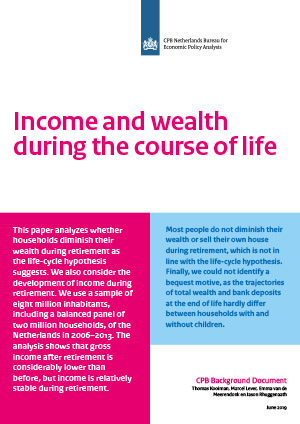June 24, 2019
Income and wealth during the course of life
Do households diminish their wealth during retirement? The life-cycle model by Modigliani and Brumberg (1954) suggests they do, but the empirical evidence in the literature does not support this hypothesis. The lack of support may be due to uncertainty about lifetime or medical expenses or due to a bequest motive, according to more recent models in the life-cycle literature.

This paper analyzes whether households diminish their wealth during retirement as the life-cycle hypothesis suggests. We also consider the development of income during retirement. We use a balanced panel of two million households, of the Netherlands in 2006–2013. The analysis shows that gross income after retirement is considerably lower than before, but income is relatively stable during retirement. Most people do not diminish their wealth or sell their own house during retirement, which is not in line with the life-cycle hypothesis. Finally, we could not identify a bequest motive, as the trajectories of total wealth and bank deposits at the end of life hardly differ between households with and without children.
Downloads
Pdf, 1.2 MB
Authors
Marcel Lever
Thomas Kooiman
Emma van de Meerendonk
Jason Rhuggenaath
